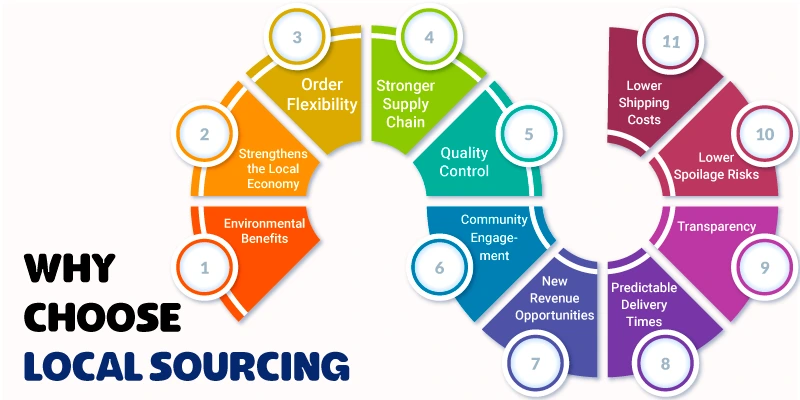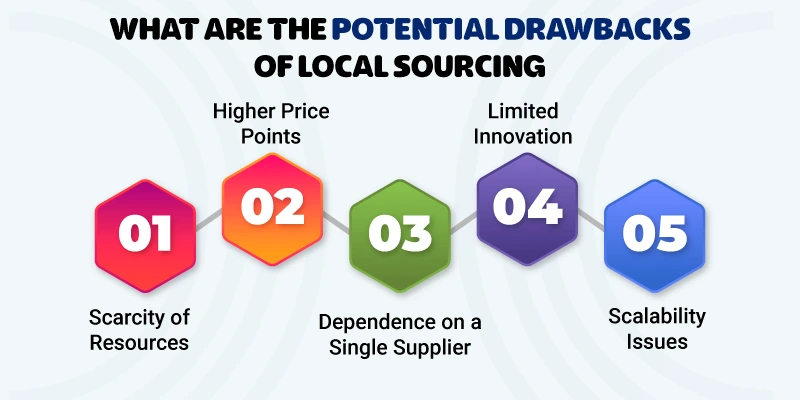
Convenience often drives our buying decisions and we're witnessing a shift toward something more thoughtful—local sourcing. It’s more than just a buzzword; it’s a movement that’s gaining momentum for a reason.
Local Sourcing is a smart choice for quality, sustainability, and community support. As more people recognize the impact of their purchasing choices, local sourcing offers a tangible way to make a positive difference.
In this blog, we'll dive into the importance of local sourcing, how it benefits businesses and consumers alike, and why more people are making the conscious choice to shop locally.
What is Local Sourcing?
Local sourcing refers to obtaining goods or services from suppliers within a specific local area or region. This is different from sourcing products from distant or international locations. It often involves buying products or materials from local farmers, manufacturers, or service providers. The goal is to support the local economy. Local sourcing can also reduce transportation costs and environmental impact. Additionally, it helps ensure the freshness or quality of goods.
How to Start Sourcing Locally
To begin sourcing locally, research suppliers in your region who align with your business needs. Look for businesses that meet your quality standards and have a commitment to sustainable practices. Establishing relationships with local manufacturers, farmers, and service providers will not only help you source locally but also build a network of trusted partners.
Getting started with local sourcing involves a thoughtful evaluation of your business requirements, your environmental impact, and the long-term benefits of supporting your community.
Why Choose Local Sourcing?
Local sourcing offers numerous benefits that can enhance your business. Let’s explore some of the key advantages that make local sourcing an attractive option for businesses today.

1. Environmental Benefits
One of the most significant advantages of local sourcing is its positive impact on the environment. Shorter transportation distances for products and raw materials mean less fuel consumption and a smaller carbon footprint. With growing awareness about environmental issues, consumers increasingly prefer companies that prioritize sustainability. By sourcing locally, your business can help align with eco-conscious trends and boost its reputation among green-minded customers.
2. Strengthens the Local Economy
Supporting local suppliers directly impacts the local economy. When businesses engage with local manufacturers, it generates jobs and stimulates economic growth. Local sourcing has a ripple effect, benefiting other local businesses as well. It also makes your community’s economic systems more resilient to global disruptions, such as supply chain crises or economic downturns.
3. Order Flexibility
Local suppliers provide the flexibility to place last-minute orders when your business needs them most. Whether there’s an unexpected demand or a supplier issue, being able to rely on nearby businesses can be invaluable. Proximity allows you to make quick visits or phone calls to resolve any issues, which is far more efficient than dealing with distant suppliers.
4. Stronger Supply Chain
With global supply chains often facing disruptions, sourcing locally can provide a more dependable and consistent supply for your business. International shipments can be delayed due to ports or airports being shut down, or due to customs issues and other challenges. Local sourcing eliminates many of these risks, ensuring that goods arrive on time, and missing or delayed shipments are easier to resolve. It’s much easier to fix problems with a local supplier in a matter of days than waiting for weeks to replace an overseas order.
5. Quality Control
Ensuring the quality of your products is crucial. Working with local suppliers allows you to maintain better quality control over the production process. You can easily visit local manufacturers to inspect products and ensure they meet your standards. Additionally, you can request adjustments or customized orders, something that can be challenging with international suppliers who may have different industrial standards.
6. Community Engagement
Local sourcing is an excellent PR strategy that highlights your business’s commitment to supporting the local economy. Building strong relationships with local suppliers fosters a sense of collaboration and trust within the community. These partnerships often create a positive reputation, helping businesses connect with customers who value locally sourced products and services.
7. New Revenue Opportunities
By sourcing locally, you not only help support the local economy, but you also attract eco-conscious customers and investors. Businesses that focus on environmental, social, and governance (ESG) factors are increasingly appealing to investors looking for transparency and ethical practices. A local sourcing strategy can create new revenue streams by appealing to these markets.
8. Predictable Delivery Times
Local sourcing reduces the distance goods need to travel, making deliveries faster and more predictable. There are fewer delays due to import regulations or customs holds. Plus, local shipments often come in smaller quantities, reducing logistics costs and warehouse space requirements.
9. Transparency
Local suppliers provide opportunities for close collaboration and frequent communication. Unlike overseas suppliers, who may only meet with you once or twice a year, you can visit local suppliers regularly to perform site inspections, discuss product development, and clarify specific needs. This level of engagement improves transparency, which enhances your business’s ESG reporting.
10. Lower Spoilage Risks
Local sourcing, particularly in the food industry, helps reduce spoilage. Goods that don’t need to travel far stay fresher for longer, which benefits both businesses and consumers. Furthermore, it contributes to reducing food miles, aligning with the growing trend of supporting local produce.
11. Lower Shipping Costs
Shipping costs are often lower when sourcing locally. International transactions often involve additional costs such as import taxes, tariffs, and fluctuating exchange rates. Local suppliers typically have more predictable pricing, making it easier to manage your budget and avoid unexpected expenses.
Read More: Sourcing Companies: What They Do and Why They Matter
What Are the Potential Drawbacks of Local Sourcing?
While local sourcing offers numerous benefits, there are some challenges to consider:

1. Scarcity of Resources
Not every region has the resources or expertise required for all types of production. In some cases, local suppliers may not be able to meet your business’s specific needs, especially if your product requires specialized materials or manufacturing techniques. Global sourcing may be necessary to access certain materials or products that aren't available locally.
2. Higher Price Points
Local sourcing can sometimes come at a higher price point. This is particularly true if the raw materials or labor costs in your region are higher than those in countries with cheaper production options. While shipping costs are reduced, the overall cost of goods may still be higher when sourcing locally, which can affect your price competitiveness.
3. Dependence on a Single Supplier
Relying too heavily on one local supplier can put your business at risk. If your primary supplier faces financial trouble or business challenges, it could disrupt your entire operation. Diversifying suppliers—both locally and globally—can help mitigate this risk.
4. Limited Innovation
Local suppliers may not always have access to the latest technology or innovations. If your industry relies on cutting-edge products or highly specialized components, you may need to look globally to find suppliers who can meet those needs.
5. Scalability Issues
Small local suppliers may not be able to keep up with a rapidly growing business. They may lack the capacity to handle large-scale production, which could limit your company’s ability to scale up. Global suppliers, on the other hand, often have the infrastructure to meet high demand.
Which Is Better, Local Sourcing or Global Sourcing?
The decision between local and global sourcing depends on your business’s specific needs. While local sourcing can be more expensive, it offers advantages in terms of environmental impact, supply chain reliability, and community support. Global sourcing, on the other hand, can offer significant cost savings, especially when raw materials or labor costs are lower abroad.
Many businesses find success with a hybrid approach—using local suppliers for certain products and global suppliers for others. This balance allows companies to benefit from both local advantages and global efficiencies.
Must- see: Local Sourcing Vs Global Sourcing

